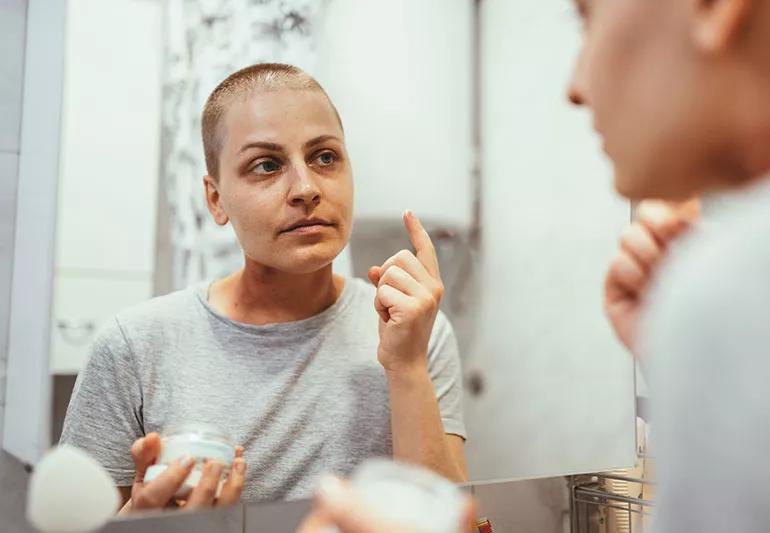AML chemotherapy side effects can be challenging. Here’s how to keep them in check

Image content: This image is available to view online.
View image online (https://assets.clevelandclinic.org/transform/546b4643-30de-4da8-bcd4-b57fcf405c22/ManagingAML-1304430161-770x533-1_jpg)
A patient with cancer is applying skin cream.
If you or someone you love is about to begin treatment for acute myeloid leukemia (AML), you probably have a lot of questions about what to expect.
Advertisement
Cleveland Clinic is a non-profit academic medical center. Advertising on our site helps support our mission. We do not endorse non-Cleveland Clinic products or services. Policy
“AML treatment side effects can vary from person to person, depending on your treatment plan,” says Hetty Carraway, MD, MBA a hematologist-oncologist who specializes in leukemia and related cancers.
Dr. Carraway discusses common side effects from AML treatment and how to manage them.
AML is cancer that affects the bone marrow, where blood cells are made. It can progress quickly, so treatment usually starts right away.
In most cases, the main treatment is chemotherapy — the application of drugs that stop cancer cells from growing. Whenever possible, adults with AML receive intensive treatment, Dr. Carraway explains.
This strong chemotherapy kills most of the bone marrow cells. That therapy can cause low blood counts and raise the risk of serious side effects such as fatigue, bleeding, and infection. “To manage those side effects, patients undergoing intensive chemotherapy often are required to stay in the hospital for four to six weeks until the immune system recovers and transfusion support is not as intense,” she says.
Other people may receive treatment with chemotherapy drugs that are taken in the outpatient clinic. “Though it isn’t as strong or intensive a treatment, it can still be very challenging,” Dr. Carraway says.
Advertisement
It’s common to experience side effects from chemotherapy, whether treatment takes place in the hospital or at home. Fortunately, there are ways to manage them.
AML affects your body’s ability to make white blood cells. That includes neutrophils, a type of white blood cell that fights infection. Chemotherapy can lower the neutrophil count even more, increasing the risk of developing an infection.
To reduce infection risk, there are several things you can do:
And some things you should avoid:
Chemotherapy medications can often cause an upset stomach or lack of appetite. “Fortunately, we now have some effective medications to handle nausea,” Dr. Carraway says. If you’re sick to your stomach, talk to your doctor about the best way to manage this symptom.
Chemotherapy can also change the taste of food, which often makes people less interested in eating. You might have to get a little creative to find appealing things, Dr. Carraway says. If plain water tastes strange, try sparkling water or water flavored with fruit juice, for example. “It’s important to drink plenty of fluids to stay well hydrated,” she adds, noting dehydration can worsen nausea.
Don’t force yourself to choke down foods that turn your stomach. Instead, focus on getting enough calories, she says. “Find what works for you and keep doing that.”
Losing hair is a common side effect of chemotherapy (although not all chemotherapy). To avoid sunburn, wear a scarf or hat to cover your head when you’re outside. A snug cap or beanie can also help you stay warm. Losing hair can be an emotional side effect for many people.
It can help to remember that it’s temporary. Your hair will grow back when you’re on the other side of treatment.
Cancer and cancer treatment can both zap your energy. Do your best to get a good night’s sleep, and rest when you need to. Regular exercise, like gentle daily walks, can help boost energy (and keep your body strong). “Try to establish a regular schedule that keeps you moving,” Dr. Carraway recommends. “The more you have a routine, the easier it is to stick with it on days you’re not feeling well.”
Some fatigue can be caused by anemia — a lack of healthy red blood cells. If you’re experiencing fatigue, talk to your care team. Your doctor may recommend a blood transfusion to increase your red blood cell count.
A cancer diagnosis is a life-changing event. Anxiety, depression and stress are common. Take steps to care for your mental health.
Advertisement
Preparing for AML chemotherapy is a lot to take in. But don’t forget that you have a team of healthcare providers whose job is to help you get better. If you have any questions about leukemia treatment side effects, don’t be afraid to bring them up.
“We’re here to support you, so call your care team if you have any concerns,” Dr. Carraway says.
Advertisement

Delivered every Tuesday!
Sign up for our Health Essentials emails for expert guidance on nutrition, fitness, sleep, skin care and more
It's a letter about the news!
Learn more about our editorial process.
Advertisement
Diet and exercise choices to manage acute myeloid leukemia symptoms
Most recommended precautions center around minimizing bruising or swelling
Even one drink can have an impact on your cognitive function leading to slurred speech, blurred vision and impaired memory
Understand who may (and may not) benefit
Lorem ipsum dolor sit amet. Et odio Quis vel ipsam omnis eum alias deleniti et placeat impedit non voluptas galisum hic autem enim et cupiditate aliquid. Est beatae quidem non facilis autem ut commodi nisi aut tempore rerum et dolores voluptatem cum enim optio id sapiente quasi. Ad laboriosam officiis 33 cupiditate sequi ea voluptatum consectetur qui necessitatibus voluptate et quasi doloremque et facere explicabo quo explicabo officia
Seeking help through therapy can be an important step in improving your quality of life when you have UC
Type 2 diabetes isn’t inevitable with these dietary changes
Applying a hot or cold compress can help with pain
Pump up your iron intake with foods like tuna, tofu and turkey